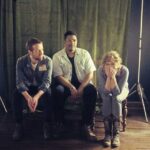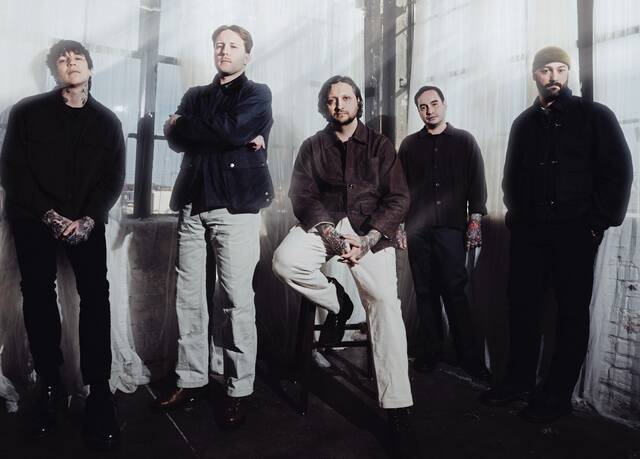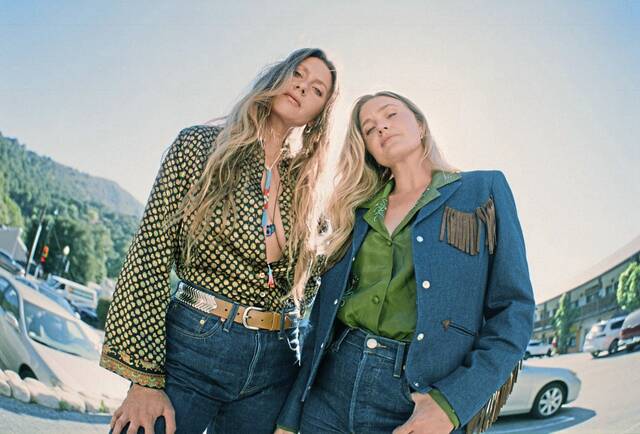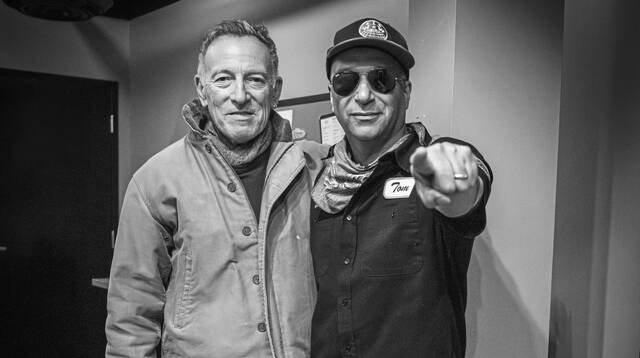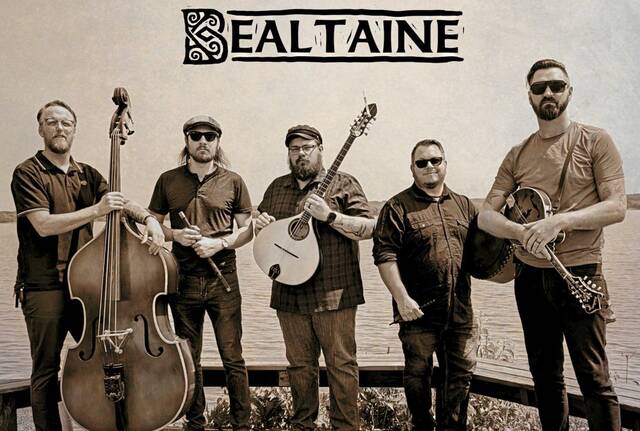With their new album “About the Winter,” the Minneapolis trio Barbaro tried to put more emphasis on, for lack of a better description, substance over style.
“The big goal for us this time around was to kind of focus on the song and craft a nice-sounding piece,” said singer/guitarist Kyle Shelstad. “Not that that wasn’t the focus before in our previous album (“Dressed in Roses”). It was just in our previous album we were maybe more focused on showcasing our skills being a bluegrass band, which often has flashy instrumental solos, things like that. And this time around we maybe less focused on solo breaks but more on how each of us can work together to create a cohesive sound around the song itself.”
Barbaro, which formed in 2017, consists of co-founder Shelstad as well as Rachel Calvert (fiddle/vocals) and Jason Wells (bass/vocals). They had been slated to tour the Northeast, including a stop in Pittsburgh on Nov. 15, but that trek has been were cancelled “due to circumstances beyond our control,” according to a social media post from the band. Instead, Barbaro will play a handful of shows, with dates in New York City, Chicago and Minneapolis.
The modern bluegrass/roots band released three singles this year — “Gardens,” “One x One” and “Apples to Apples” — culminating in the “About the Winter” release on Oct. 20. The band, named after the 2006 Kentucky Derby champion horse that had to be euthanized, recorded the album during the winter of 2022 at The Hive studio, which sits in a refurbished barn in Wisconsin.
All three members of the band joined a Google Meet on the album’s release date to discuss the record, the band’s sound and how they’ve grown:
On the album finally being released:
Shelstad: It’s exciting. It’s been like many years of work between writing the tunes, putting them together, kind of crafting the album itself and what songs we want to be on it. It’s been a labor of love over the past, you know, at least three years. So I’m just excited to be moving forward a little bit, not like we weren’t moving forward before but your head’s just wrapped in this create-the-album-market-it kind of thing.
On the band’s musical growth:
Calvert: I think we all had a little growth in just like being open, I don’t know, to creativity or being open to creating a kind of sound that maybe because of genre or because of past musical experiences or whatever, I think we just really opened ourselves to letting these songs kind of unfold in the studio in a way that wasn’t about trying to fit into something and was more about just evolving into each of the songs’ kind of world. And I think that takes a kind of mature editing and a mature faith that is exciting to kind of grow into.
On how to describe the band’s sound:
Rachel: This is a tough question. I always struggle to answer, but actually my fiancé described us recently in a way that I thought was kind of funny to his father, which is, it’s kind of like world music, but Americana and that there’s this interest in texture and an interest in exploring sound outside of a blueprint for American music. But yet the world that we’re kind of borrowing from is so rooted in American folk tradition. But it’s like entering this other realm that’s kind of apart from these standard blueprints of what you’d expect from an American folk band. So I thought that was kind of a funny response that I agreed with.
Shelstad: Yeah, that’s exactly what I was going to say, (we) found a way to play music together and create sound that’s enjoyable to us. And in order to sell it you need to categorize it. And so it’s nice when you hear things like this or somebody called it pastoral Americana. And it’s like ‘Great!’ That all works for me.
On the differences playing together now vs. when they started:
Wells: We’ve kind of grown our sound together over the years, so playing together for five years, we’ve developed a certain amount of chemistry among the band. And I would say that was stronger on this album than it was on that first album because we were still — the band had existed for a while — but I think us as that current lineup was really on the newer side, so we were I think all knew kind of what we wanted to do but not quite how to create it in as strong of a way as we did for this previous album. So I think that’s like the biggest kind of growth I’ve seen just as a band in general for that. You can see that in our live performances and all that kind of thing; there’s a certain amount of knowing in terms of what each night, what’s gonna happen on stage and how you’re gonna feel, all that kind of stuff, is solidified over the course of us getting more familiar playing together.
On the “About the Winter” title:
Calvert: Yeah, there’s a lyric in one of the songs called ‘Let’s Talk About the Winter,’ which originally I brought for the band as like, ‘That would be a cool title.’ And we concluded that might be a little bit of a mouthful, so we kind of shortened it to ‘About the Winter.’ But we recorded it when there was snow on the ground. And we’re also, I feel like, coming out of kind of a winter of life, of transitions, seasons of death and whether it’s personal levels of just heartbreak or what am I doing with my life and interpersonal relationships, career, music, and then in the world, global conflict, pandemic, and I find the songs both in their form and the arrangement, but also lyrically are pretty emotive. So I think we’re talking about the winter here. So for me, this album is very much like, let’s get into the, let’s kind of whip through the emotional murkiness of a seasonal, a personal, a global winter, and use this music to navigate what that is so we can all understand it a little bit better. That’s kind of my reasonings of why I was drawn to that.
On how the environment affected their album:
Shelstad: I think a lot. I mean, the climate up here, I mean, you’re in Pittsburgh, so I’m sure it’s not much better. But the weather winter, I think we were all kind of climbing out of the winter, which we recorded in March. So I think although it has that winter kind of, has that dark, long seemingly never-ending time of the year, I think it also kind of marks some rebirth and a chance for renewal. So kind of piggybacking out what Rachel said where just kind of looking back on that cold season and then looking forward to the spring and rebirth had a lot to do it, with our recording it in March. Or we’d have a sunny day and then the next day it would be snowing and then mentally we’re all in that part of the year, where it’s let’s get the (expletive) out of winter, move on, it’s been cold, it’s been gray.
Related
• The 1975, Ghost Hounds, Bret Michaels among November's top concerts around Pittsburgh• Grace Potter on her love of Pittsburgh, 'Mother Road' album, 'Lady Vagabond' and driving fast
• Indie pop singer Samia on headlining shows, 'Honey' album, collaboration and famous parents
On being more of a band now rather than individuals playing together:
Calvert: I feel like sometimes we have this tendency to knock our last album, and I don’t necessarily know if it’s growth or better than our last, I think our last album is really thoughtful and cohesive. However, I think there’s a maturity in showing another side of a project that isn’t afraid to be like, slow. I think commercially it makes sense to make an album that’s more of a party album and more high energy. And I think having confidence in a side that’s more vulnerable, more intimate, and maybe isn’t for a room full of people who wants to dance, but is inviting people to take maybe a more serious and perspective journey with us, the growth is just the confidence to be able to show that other side of yourself musically. And I think that having those two sides of ourselves, one isn’t better than the other, but they’re very complementary. But it does take maturity to move away from a way that you’ve maybe shown yourself in the past, because it’s easy just to want to continue that one brand. But it’s scarier to be like, well we also do this and this is very meaningful for us as well.
On the logistics of touring:
Calvert: Well, I quit my day job so that I could do things like this for the band, and I just felt like I reached a point where life is short and you have to do what you love while you can and we don’t have children yet and it seemed like the right time to take a little leap of faith. I have a great part-time job that’s super flexible … and finding something like that, leaning heavily on the support systems I have, a wonderful fiancé and my family who I know have my back when things get really tough. But it is hard. My advice to people who are like, should I give up everything and pursue music? Probably not unless you win the lottery or have rich, well-connected parents. Otherwise you’re just going to be really frustrated and broke every day and it’s, it’s hard. But it’s a labor of love and it’s just like having faith that what we’re doing is worth it because the music is worth it.




